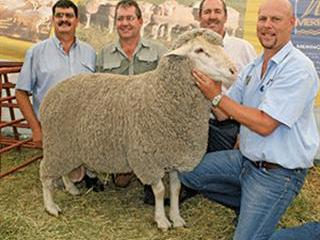The national Department of Agriculture (DoA) has appointed the Centre for Agricultural Management in the Department of Economics at the University of the Free State (UFS) to roll out a model for small, medium and micro enterprises (SMMEs) for farmers.
The model, which is used worldwide, was initially adapted by the Department of Trade and Industry as an SMME excellence model and the DoA further adapted it for agricultural purposes.“The excellence model aims to help farmers identify gaps in business skills. These gaps will be addressed by means of short courses, which will help to close the gap between the first and fourth economy,” explained Dr Wimpie Nell, director of the Centre for Agricultural Management at the UFS.
As coordinator of the SMME excellence model the UFS, as well as the DoA, the private sector, municipalities, small enterprise development agencies and NGOs will be working together to enhance excellence in agricultural businesses in the Free State. The benefit of the model is that it changes the mindset of emerging farmers so that they see agriculture as a business and not a way of living. “We also want to create a culture of competitiveness and sustainability among emerging farmers,” Dr Nell said.
The is the second province in which the model has been implemented and another four provinces will follow later this year. The of Excellence at the UFS has already trained 23 officers from the DoA, the NGOs and the private sector as facilitators, said Dr Nell.
The facilitator training takes place during four contact sessions, which include farm visits where they get the opportunity to apply what they’ve learnt. On completion of the training, facilitators use the excellence model to evaluate farming businesses and identify which skills (financial, entrepreneurial, etc) the farmers need.
This year, 20 facilitators will receive training in June and another 20 in October. “The more facilitators we can train, the more farmers will benefit from the model,” said Dr Nell. – Staff reporter
Lacklustre government is killing agriculture
The slow pace of transformation has nothing to do with farmers’ unwillingness to cooperate and everything with government’s lack of desire to make it work, Jean Engelbrecht from the Rust en Vrede Wine Estate told delegates at the recent Cellars SA meeting in Stellenbosch. “For them, transformation has become a political tool,” he said.
Engelbrecht added that the ANC’s president, Jacob Zuma, recently admitted as much to him, saying the lack of progress with transformation in the sector is due to leadership failure.Tobias Doyer, head of Santam Agri, also referred to the lack of sufficient support from government. “Government would rather invest in industry, police and justice than in a sector that’s dominated by the white population. Transformation is, however, imperative for political stability,” he explained, adding that land transformation must not be at the cost of agricultural sustainability and production. He also highlighted that primary agriculture currently contributes between 2,6% and 2,8% to the GDP.
A 30% drop in agricultural production would translate into a 0,8% to 0,9% drop in the industry’s contribution to the GDP.
Doyer added that the sector is also crippled by a lack of government support for subsidies, infrastructure investment and import protection. He pointed out that an Organisation for Economic Cooperation and Development producer who receives a 31% subsidy already earns 31% more than a local producer before even selling a product.
To address these problems, Doyer suggested that the industry realigns itself with government and builds relationships with the right people. This would help to “ensure the importance of agriculture for sustainable food production and job creation is understood, and obtain support to build the sector so it can reach its full potential,” Doyer said. – Glenneis Erasmus
KZN looks east for prosperity
The KwaZulu-Natal government says the province is about to unleash its full agricultural potential with help from the Chinese government, which has promised to share its experiences in small-scale farmer development with KZN’s Department of and Environmental Affairs (DAEA).
nine-person delegation from the KZN’s DAEA and premier’s office recently visited the People’s Republic of China to explore how their technology could be transferred to small-scale farmers in KZN.“This included capacity building through exchange programmes, together with market development wherein small-scale and commercial farmers from KwaZulu-Natal could access the Chinese market with their agricultural products,” said KZN DAEA spokesman, Mbulelo Baloyi. “KwaZulu-already has three memoranda of understanding with China’s three provinces.”
Mtholephi Mthimkhulu, MEC for Agriculture and Environmental Affairs in KZN, added that his department’s delegation to China used the opportunity to follow up on department-specific projects in China.The KZN DAEA delegation was headed by acting head of department Siddiq Adam and included various other senior government officials from the province.
Sites visited in China included Camco International, a Chinese parastatal involved in developing agricultural technology and product design, the Yanbei Science and Technology Group, a leading Chinese supplier of animal husbandry and poultry farming equipment, and the Foton Lovol International Heavy Industry Company, which develops, manufactures and markets agricultural equipment.The latter exports mainly mechanisation products and vehicles to more than 70 countries, including SA. – Lloyd Phillips









